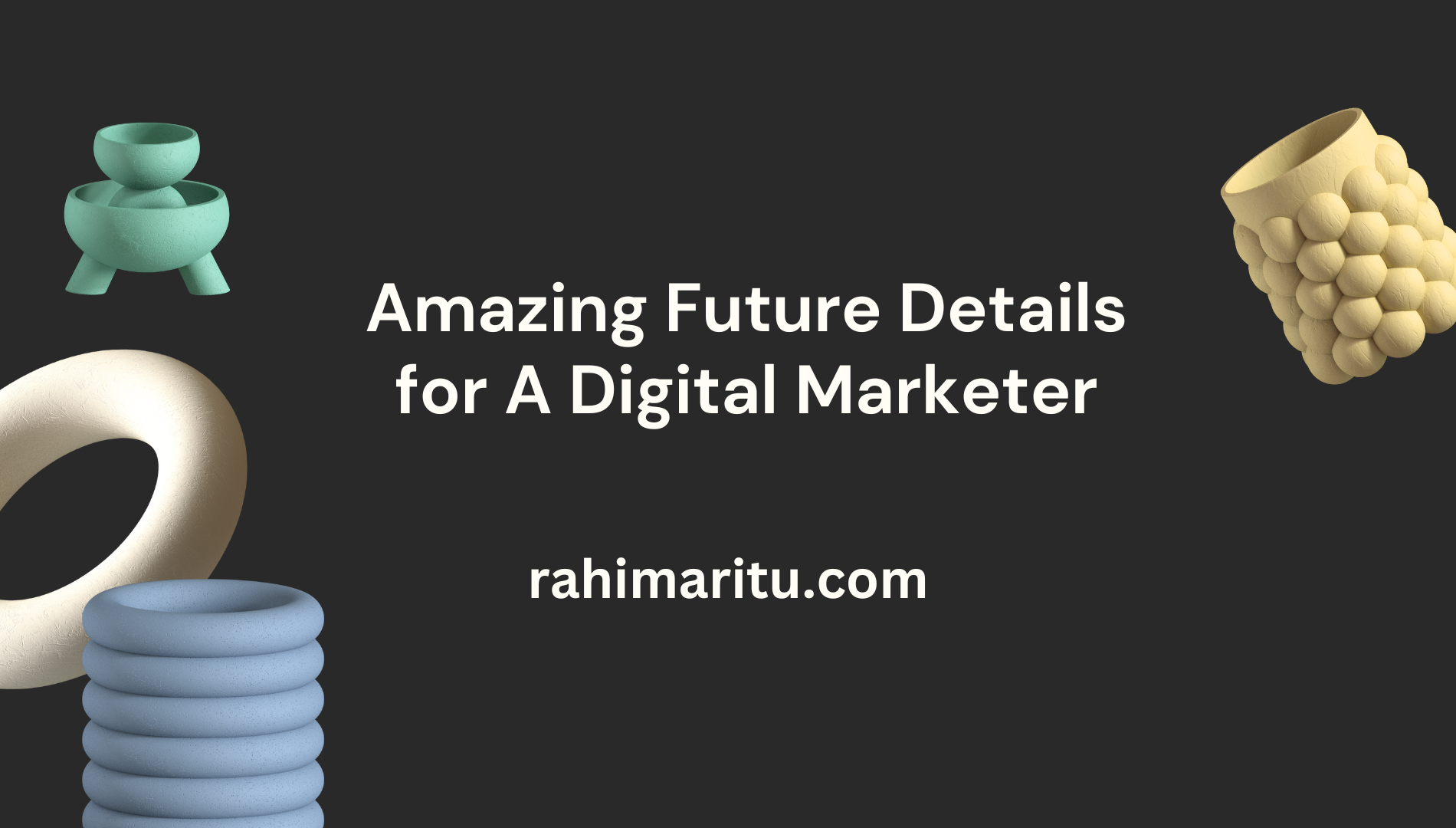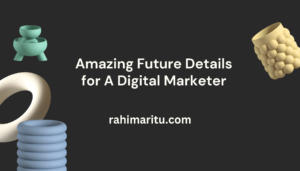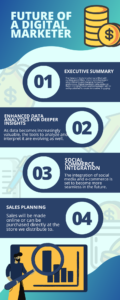
In 2024 Amazing Future Details for A digital marketer
In 2024 Amazing Future Details for A digital marketer
A Digital Marketer–
A digital marketer is a professional who specializes in utilizing digital channels, technologies, and strategies to promote products, services, or brands. Digital marketing encompasses a broad range of activities, including online advertising, social media marketing, content creation, search engine optimization (SEO), email marketing, and more. The primary goal of a digital marketer is to reach and engage with a target audience through various online platforms, ultimately driving awareness, traffic, leads, and conversions for a business or organization.
Key responsibilities of digital marketers may include:
- Social Media Management: Creating and managing content on social media platforms like Facebook, Twitter, Instagram, and LinkedIn to build brand presence and engage with the audience.
- Search Engine Optimization (SEO): Optimizing website content and structure to improve visibility on search engines, thereby increasing organic (non-paid) traffic.
- Content Marketing: Developing and distributing valuable and relevant content to attract and retain a target audience. This can include blog posts, videos, infographics, and more.
- Email Marketing: Designing and executing email campaigns to nurture leads, communicate with customers, and promote products or services.
- Paid Advertising: Running digital advertising campaigns on platforms like Google Ads, Facebook Ads, or other online advertising networks to reach specific target audiences.
- Analytics and Data Analysis: Using tools to track and analyze the performance of digital marketing efforts, making data-driven decisions to optimize campaigns.
- Conversion Rate Optimization (CRO): Improving the effectiveness of digital marketing strategies by enhancing the conversion rates of website visitors into customers or leads.
- Digital Strategy Development: Creating comprehensive digital marketing strategies aligned with overall business goals and objectives.
In the ever-evolving landscape of digital marketing, professionals must stay ahead of the curve to remain competitive and successful. As technology continues to advance, the future holds exciting prospects for digital marketers. From artificial intelligence (AI) to immersive technologies, here are some amazing future details that will shape the world of digital marketing.
Download
1. Artificial Intelligence Revolutionizing Personalization:
Artificial intelligence is set to transform the way digital marketers approach personalization. AI algorithms can analyze vast amounts of data to understand consumer behavior and preferences, allowing marketers to deliver highly targeted and personalized content. This level of customization enhances user experience and increases the effectiveness of marketing campaigns.
2. Rise of Voice Search and Conversational Marketing:
With the growing popularity of virtual assistants and smart speakers, voice search is becoming a significant player in digital marketing. Digital marketers must adapt their strategies to accommodate voice search queries, optimizing content for more conversational and natural language. Additionally, conversational marketing through chatbots powered by AI is on the rise, providing real-time engagement with users.
3. Enhanced Data Analytics for Deeper Insights:
As data becomes increasingly valuable, the tools to analyze and interpret it are evolving as well. Future digital marketers will have access to advanced analytics platforms that provide deeper insights into consumer behavior, preferences, and trends. Predictive analytics will enable marketers to anticipate user needs and tailor their strategies accordingly.
4. Augmented and Virtual Reality Transforming Experiences:
Augmented reality (AR) and virtual reality (VR) technologies are set to revolutionize the way consumers interact with brands. Digital marketers can leverage AR to provide immersive experiences, allowing customers to visualize products in their real-world environment before making a purchase. VR, on the other hand, offers opportunities for creating virtual storefronts and unique brand experiences.
5. Blockchain for Transparent and Secure Transactions:
Blockchain technology is not limited to cryptocurrencies; it also holds immense potential for digital marketing. Marketers can utilize blockchain for transparent and secure transactions, ensuring the authenticity of digital assets and preventing fraud. This technology can enhance trust between brands and consumers, especially in industries where authenticity is crucial.
6. Social Commerce Integration:
The integration of social media and e-commerce is set to become more seamless in the future. Social commerce platforms will evolve, allowing users to make purchases directly within their favorite social media apps. Digital marketers need to stay attuned to these changes, optimizing their strategies to leverage the social commerce trend effectively.
7. Sustainability as a Key Marketing Element:
As environmental concerns continue to gain prominence, sustainability will become a key element of digital marketing strategies. Consumers are increasingly conscious of the environmental impact of their purchases, and brands that incorporate sustainable practices into their messaging will resonate more with their target audience.
Conclusion:
The future of digital marketing is filled with exciting possibilities, driven by technological advancements and changing consumer preferences. Digital marketers who embrace these emerging trends and technologies will be well-positioned to create innovative, engaging, and successful campaigns. Staying informed and adaptable in this dynamic landscape is key to unlocking the full potential of the amazing future that awaits digital marketers.
Q1: What is the significance of artificial intelligence in the future of digital marketing?
A1: Artificial intelligence (AI) is poised to revolutionize personalization in digital marketing. AI algorithms analyze vast amounts of data to understand consumer behavior and preferences, allowing marketers to deliver highly targeted and personalized content.
Q2: How will voice search impact digital marketing strategies in the future?
A2: With the rise of virtual assistants and smart speakers, voice search is becoming significant in digital marketing. Marketers will need to optimize content for more natural language and embrace conversational marketing to adapt to this shift.
Q3: What role do augmented and virtual reality play in the future of digital marketing?
A3: Augmented reality (AR) and virtual reality (VR) technologies are set to transform user experiences. Marketers can leverage AR for immersive product experiences, while VR offers opportunities for creating virtual storefronts and unique brand interactions.
Q4: How can blockchain technology be integrated into digital marketing strategies?
A4: Blockchain technology can be utilized for transparent and secure transactions in digital marketing. It ensures the authenticity of digital assets, preventing fraud and enhancing trust between brands and consumers.
Q5: What is social commerce, and how is it evolving in the future of digital marketing?
A5: Social commerce is the integration of social media and e-commerce. In the future, platforms will likely evolve to allow users to make purchases directly within social media apps, and digital marketers need to adapt their strategies to leverage this trend effectively.
Q6: Why is sustainability becoming a key element in digital marketing?
A6: With growing environmental concerns, sustainability is becoming crucial in digital marketing. Consumers are increasingly conscious of the environmental impact of their purchases, and brands that incorporate sustainable practices into their messaging resonate more with their target audience.
Q7: How can digital marketers stay informed and adaptable in the dynamic landscape of the future?
A7: Digital marketers can stay informed by continuously learning about emerging trends and technologies. Keeping up with industry news, attending conferences, and participating in relevant communities can help them stay ahead in the rapidly evolving digital marketing landscape.




4 Comments
Hot Deals
December 24, 2023Hot Deals at Aliexpress https://s.click.aliexpress.com/e/_DldnjaJ
Unleashing Branding Power: 5 Strategies for Business Success
December 25, 2023[…] Another interesting blog you can check it out here. […]
Unleashing Branding Power: 5 Strategies for Business Success - Digital Marketer
December 29, 2023[…] Another interesting blog you can check it out here. […]
Search Engine Optimization
January 7, 2024[…] Optimization (SEO) best practices is crucial for a sustainable online presence in a competitive digital […]